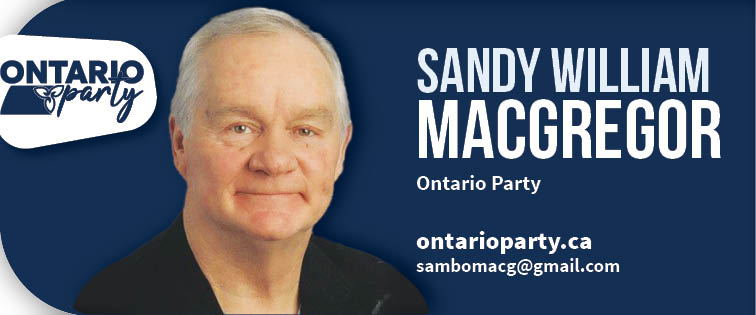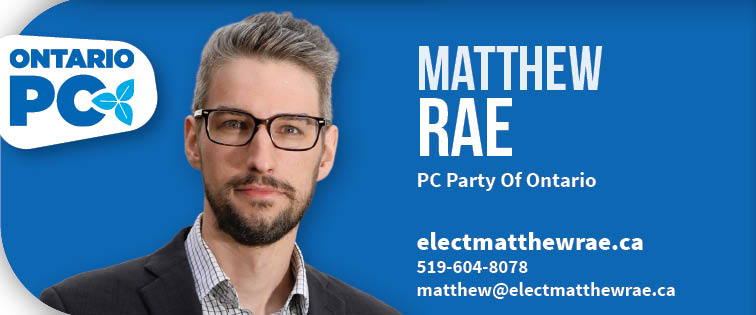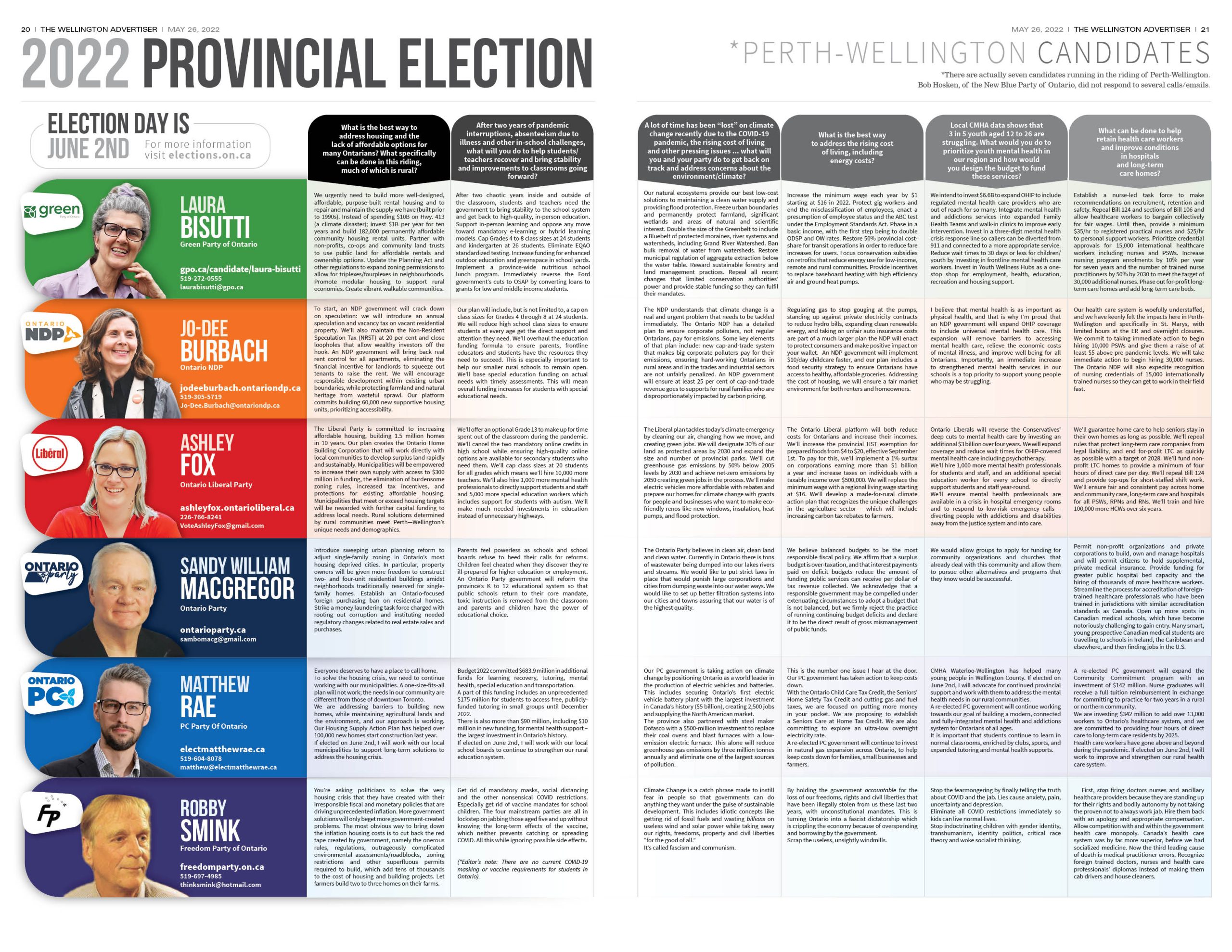PERTH-WELLINGTON – As part of the Wellington Advertiser’s coverage of the 2022 provincial election, the newspaper offered all local candidates a chance to participate in a Q&A feature leading up to the June 2 election.
*There are actually seven candidates running in the riding of Perth-Wellington. Bob Hosken, of the New Blue Party of Ontario, did not respond to several calls/emails.

What is the best way to address housing and the lack of affordable options form any Ontarians? What specifically can be done in this riding, much of which is rural?
We urgently need to build more well-designed, affordable, purpose-built rental housing and to repair and maintain the supply we have (built prior to 1990s). Instead of spending $10B on Hwy. 413 (a climate disaster); invest $1B per year for ten years and build 182,000 permanently affordable community housing rental units. Partner with non-profits, co-ops and community land trusts to use public land for affordable rentals and ownership options. Update the Planning Act and other regulations to expand zoning permissions to allow for triplexes/fourplexes in neighbourhoods. Promote modular housing to support rural economies. Create vibrant walkable communities.
After two years of pandemic interruptions, absenteeism due to illness and other in-school challenges, what will you do to help students/teachers recover and bring stability and improvements to classrooms going forward?
After two chaotic years inside and outside of the classroom, students and teachers need the government to bring stability to the school system and get back to high-quality, in-person education. Support in-person learning and oppose any move toward mandatory e-learning or hybrid learning models. Cap Grades 4 to 8 class sizes at 24 students and kindergarten at 26 students. Eliminate EQAO standardized testing. Increase funding for enhanced outdoor education and greenspace in school yards. Implement a province-wide nutritious school lunch program. Immediately reverse the Ford government’s cuts to OSAP by converting loans to grants for low and middle income students.
A lot of time has been “lost” on climate change recently due to the COVID-19 pandemic, the rising cost of living and other pressing issues … what will you and your party do to get back on track and address concerns about the environment/climate?
Our natural ecosystems provide our best low-cost solutions to maintaining a clean water supply and providing flood protection. Freeze urban boundaries and permanently protect farmland, significant wetlands and areas of natural and scientific interest. Double the size of the Greenbelt to include a Bluebelt of protected moraines, river systems and watersheds, including Grand River Watershed. Ban bulk removal of water from watersheds. Restore municipal regulation of aggregate extraction below the water table. Reward sustainable forestry and land management practices. Repeal all recent changes that limited conservation authorities’ power and provide stable funding so they can fulfil their mandates.
What is the best way to address the rising cost of living, including energy costs?
Increase the minimum wage each year by $1 starting at $16 in 2022. Protect gig workers and end the misclassification of employees, enact a presumption of employee status and the ABC test under the Employment Standards Act. Phase in a basic income, with the first step being to double ODSP and OW rates. Restore 50% provincial cost-share for transit operations in order to reduce fare increases for users. Focus conservation subsidies on retrofits that reduce energy use for low-income, remote and rural communities. Provide incentives to replace baseboard heating with high efficiency air and ground heat pumps.
Local CMHA data shows that3 in 5 youth aged 12 to 26 are struggling. What would you do to prioritize youth mental health in our region and how would you design the budget to fund these services?
We intend to invest $6.6B to expand OHIP to include regulated mental health care providers who are out of reach for so many. Integrate mental health and addictions services into expanded Family Health Teams and walk-in clinics to improve early intervention. Invest in a three-digit mental health crisis response line so callers can be diverted from 911 and connected to a more appropriate service. Reduce wait times to 30 days or less for children/youth by investing in frontline mental health care workers. Invest in Youth Wellness Hubs as a one-stop shop for employment, health, education, recreation and housing support.
What can be done to help retain health care workers and improve conditions in hospitals and long-term care homes?
Establish a nurse-led task force to make recommendations on recruitment, retention and safety. Repeal Bill 124 and sections of Bill 106 and allow healthcare workers to bargain collectively for fair wages. Until then, provide a minimum $35/hr to registered practical nurses and $25/hr to personal support workers. Prioritize credential approvals for 15,000 international healthcare workers including nurses and PSWs. Increase nursing program enrolments by 10% per year for seven years and the number of trained nurse practitioners by 50% by 2030 to meet the target of 30,000 additional nurses. Phase out for-profit long-term care homes and add long-term care beds.

What is the best way to address housing and the lack of affordable options form any Ontarians? What specifically can be done in this riding, much of which is rural?
To start, an NDP government will crack down on speculation: we will introduce an annual speculation and vacancy tax on vacant residential property. We’ll also maintain the Non-Resident Speculation Tax (NRST) at 20 per cent and close loopholes that allow wealthy investors off the hook. An NDP government will bring back real rent control for all apartments, eliminating the financial incentive for landlords to squeeze out tenants to raise the rent. We will encourage responsible development within existing urban boundaries, while protecting farmland and natural heritage from wasteful sprawl. Our platform commits building 60,000 new supportive housing units, prioritizing accessibility.
After two years of pandemic interruptions, absenteeism due to illness and other in-school challenges, what will you do to help students/teachers recover and bring stability and improvements to classrooms going forward?
Our plan will include, but is not limited to, a cap on class sizes for Grades 4 through 8 at 24 students. We will reduce high school class sizes to ensure students at every age get the direct support and attention they need. We’ll overhaul the education funding formula to ensure parents, frontline educators and students have the resources they need to succeed. This is especially important to help our smaller rural schools to remain open. We’ll base special education funding on actual needs with timely assessments. This will mean overall funding increases for students with special educational needs.
A lot of time has been “lost” on climate change recently due to the COVID-19 pandemic, the rising cost of living and other pressing issues … what will you and your party do to get back on track and address concerns about the environment/climate?
The NDP understands that climate change is a real and urgent problem that needs to be tackled immediately. The Ontario NDP has a detailed plan to ensure corporate polluters, not regular Ontarians, pay for emissions. Some key elements of that plan include: new cap-and-trade system that makes big corporate polluters pay for their emissions, ensuring hard-working Ontarians in rural areas and in the trades and industrial sectors are not unfairly penalized. An NDP government will ensure at least 25 per cent of cap-and-trade revenue goes to supports for rural families who are disproportionately impacted by carbon pricing.
What is the best way to address the rising cost of living, including energy costs?
Regulating gas to stop gouging at the pumps, standing up against private electricity contracts to reduce hydro bills, expanding clean renewable energy, and taking on unfair auto insurance costs are part of a much larger plan the NDP will enact to protect consumers and make positive impact on your wallet. An NDP government will implement $10/day childcare faster, and our plan includes a food security strategy to ensure Ontarians have access to healthy, affordable groceries. Addressing the cost of housing, we will ensure a fair market environment for both renters and homeowners.
Local CMHA data shows that3 in 5 youth aged 12 to 26 are struggling. What would you do to prioritize youth mental health in our region and how would you design the budget to fund these services?
I believe that mental health is as important as physical health, and that is why I’m proud that an NDP government will expand OHIP coverage to include universal mental health care. This expansion will remove barriers to accessing mental health care, relieve the economic costs of mental illness, and improve well-being for all Ontarians. Importantly, an immediate increase to strengthened mental health services in our schools is a top priority to support young people who may be struggling.
What can be done to help retain health care workers and improve conditions in hospitals and long-term care homes?
Our health care system is woefully understaffed, and we have keenly felt the impacts here in Perth-Wellington and specifically in St. Marys, with limited hours at the ER and overnight closures. We commit to taking immediate action to begin hiring 10,000 PSWs and give them a raise of at least $5 above pre-pandemic levels. We will take immediate action to begin hiring 30,000 nurses. The Ontario NDP will also expedite recognition of nursing credentials of 15,000 internationally trained nurses so they can get to work in their field fast.

What is the best way to address housing and the lack of affordable options form any Ontarians? What specifically can be done in this riding, much of which is rural?
The Liberal Party is committed to increasing affordable housing, building 1.5 million homes in 10 years. Our plan creates the Ontario Home Building Corporation that will work directly with local communities to develop surplus land rapidly and sustainably. Municipalities will be empowered to increase their own supply with access to $300 million in funding, the elimination of burdensome zoning rules, increased tax incentives, and protections for existing affordable housing. Municipalities that meet or exceed housing targets will be rewarded with further capital funding to address local needs. Rural solutions determined by rural communities meet Perth—Wellington’s unique needs and demographics.
After two years of pandemic interruptions, absenteeism due to illness and other in-school challenges, what will you do to help students/teachers recover and bring stability and improvements to classrooms going forward?
We’ll offer an optional Grade 13 to make up for time spent out of the classroom during the pandemic. We’ll cancel the two mandatory online credits in high school while ensuring high-quality online options are available for secondary students who need them. We’ll cap class sizes at 20 students for all grades which means we’ll hire 10,000 more teachers. We’ll also hire 1,000 more mental health professionals to directly support students and staff and 5,000 more special education workers which includes support for students with autism. We’ll make much needed investments in education instead of unnecessary highways.
A lot of time has been “lost” on climate change recently due to the COVID-19 pandemic, the rising cost of living and other pressing issues … what will you and your party do to get back on track and address concerns about the environment/climate?
The Liberal plan tackles today’s climate emergency by cleaning our air, changing how we move, and creating green jobs. We will designate 30% of our land as protected areas by 2030 and expand the size and number of provincial parks. We’ll cut greenhouse gas emissions by 50% below 2005 levels by 2030 and achieve net-zero emissions by 2050 creating green jobs in the process. We’ll make electric vehicles more affordable with rebates and prepare our homes for climate change with grants for people and businesses who want to make eco-friendly renos like new windows, insulation, heat pumps, and flood protection.
What is the best way to address the rising cost of living, including energy costs?
The Ontario Liberal platform will both reduce costs for Ontarians and increase their incomes. We’ll increase the provincial HST exemption for prepared foods from $4 to $20, effective September 1st. To pay for this, we’ll implement a 1% surtax on corporations earning more than $1 billion a year and increase taxes on individuals with a taxable income over $500,000. We will replace the minimum wage with a regional living wage starting at $16. We’ll develop a made-for-rural climate action plan that recognizes the unique challenges in the agriculture sector – which will include increasing carbon tax rebates to farmers.
Local CMHA data shows that3 in 5 youth aged 12 to 26 are struggling. What would you do to prioritize youth mental health in our region and how would you design the budget to fund these services?
Ontario Liberals will reverse the Conservatives’ deep cuts to mental health care by investing an additional $3 billion over four years. We will expand coverage and reduce wait times for OHIP-covered mental health care including psychotherapy. We’ll hire 1,000 more mental health professionals for students and staff, and an additional special education worker for every school to directly support students and staff year-round. We’ll ensure mental health professionals are available in a crisis in hospital emergency rooms and to respond to low-risk emergency calls – diverting people with addictions and disabilities away from the justice system and into care.
What can be done to help retain health care workers and improve conditions in hospitals and long-term care homes?
We’ll guarantee home care to help seniors stay in their own homes as long as possible. We’ll repeal rules that protect long-term care companies from legal liability, and end for-profit LTC as quickly as possible with a target of 2028. We’ll fund non-profit LTC homes to provide a minimum of four hours of direct care per day. We’ll repeal Bill 124 and provide top-ups for short-staffed shift work. We’ll ensure fair and consistent pay across home and community care, long-term care and hospitals for all PSWs, RPNs and RNs. We’ll train and hire 100,000 more HCWs over six years.

What is the best way to address housing and the lack of affordable options form any Ontarians? What specifically can be done in this riding, much of which is rural?
Introduce sweeping urban planning reform to adjust single-family zoning in Ontario’s most housing deprived cities. In particular, property owners will be given more freedom to construct two- and four-unit residential buildings amidst neighbourhoods traditionally reserved for single-family homes. Establish an Ontario-focused foreign purchasing ban on residential homes. Strike a money laundering task force charged with rooting out corruption and instituting needed regulatory changes related to real estate sales and purchases.
After two years of pandemic interruptions, absenteeism due to illness and other in-school challenges, what will you do to help students/teachers recover and bring stability and improvements to classrooms going forward?
Parents feel powerless as schools and school boards refuse to heed their calls for reforms. Children feel cheated when they discover they’re ill-prepared for higher education or employment. An Ontario Party government will reform the province’s K to 12 educational system so that public schools return to their core mandate, toxic instruction is removed from the classroom and parents and children have the power of educational choice.
A lot of time has been “lost” on climate change recently due to the COVID-19 pandemic, the rising cost of living and other pressing issues … what will you and your party do to get back on track and address concerns about the environment/climate?
The Ontario Party believes in clean air, clean land and clean water. Currently in Ontario there is tons of wastewater being dumped into our lakes rivers and streams. We would like to put strict laws in place that would punish large corporations and cities from dumping waste into our water ways. We would like to set up better filtration systems into our cities and towns assuring that our water is of the highest quality.
What is the best way to address the rising cost of living, including energy costs?
We believe balanced budgets to be the most responsible fiscal policy. We affirm that a surplus budget is over-taxation, and that interest payments paid on deficit budgets reduce the amount of funding public services can receive per dollar of tax revenue collected. We acknowledge that a responsible government may be compelled under extenuating circumstances to adopt a budget that is not balanced, but we firmly reject the practice of running continuing budget deficits and declare it to be the direct result of gross mismanagement of public funds.
Local CMHA data shows that3 in 5 youth aged 12 to 26 are struggling. What would you do to prioritize youth mental health in our region and how would you design the budget to fund these services?
We would allow groups to apply for funding for community organizations and churches that already deal with this community and allow them to pursue other alternatives and programs that they know would be successful.
What can be done to help retain health care workers and improve conditions in hospitals and long-term care homes?
Permit non-profit organizations and private corporations to build, own and manage hospitals and will permit citizens to hold supplemental, private medical insurance. Provide funding for greater public hospital bed capacity and the hiring of thousands of more healthcare workers. Streamline the process for accreditation of foreign-trained healthcare professionals who have been trained in jurisdictions with similar accreditation standards as Canada. Open up more spots in Canadian medical schools, which have become notoriously challenging to gain entry. Many smart, young prospective Canadian medical students are travelling to schools in Ireland, the Caribbean and elsewhere, and then finding jobs in the U.S.

What is the best way to address housing and the lack of affordable options form any Ontarians? What specifically can be done in this riding, much of which is rural?
Everyone deserves to have a place to call home. To solve the housing crisis, we need to continue working with our municipalities. A one-size-fits-all plan will not work; the needs in our community are different from those of downtown Toronto.
We are addressing barriers to building new homes, while maintaining agricultural lands and the environment, and our approach is working. Our Housing Supply Action Plan has helped over 100,000 new homes start construction last year. If elected on June 2nd, I will work with our local municipalities to support long-term solutions to address the housing crisis.
After two years of pandemic interruptions, absenteeism due to illness and other in-school challenges, what will you do to help students/teachers recover and bring stability and improvements to classrooms going forward?
Budget 2022 committed $683.9 million in additional funds for learning recovery, tutoring, mental health, special education and transportation. A part of this funding includes an unprecedented $175 million for students to access free, publicly-funded tutoring in small groups until December 2022.
There is also more than $90 million, including $10 million in new funding, for mental health support – the largest investment in Ontario’s history. If elected on June 2nd, I will work with our local school boards to continue to strengthen our rural education system.
A lot of time has been “lost” on climate change recently due to the COVID-19 pandemic, the rising cost of living and other pressing issues … what will you and your party do to get back on track and address concerns about the environment/climate?
Our PC government is taking action on climate change by positioning Ontario as a world leader in the production of electric vehicles and batteries. This includes securing Ontario’s first electric vehicle battery plant with the largest investment in Canada’s history ($5 billion), creating 2,500 jobs and supplying the North American market.
The province also partnered with steel maker Dofasco with a $500-million investment to replace their coal ovens and blast furnaces with a low-emission electric furnace. This alone will reduce greenhouse gas emissions by three million tonnes annually and eliminate one of the largest sources of pollution.
What is the best way to address the rising cost of living, including energy costs?
This is the number one issue I hear at the door. Our PC government has taken action to keep costs down.
With the Ontario Child Care Tax Credit, the Seniors’ Home Safety Tax Credit and cutting gas and fuel taxes, we are focused on putting more money in your pocket. We are proposing to establish a Seniors Care at Home Tax Credit. We are also committing to explore an ultra-low overnight electricity rate.
A re-elected PC government will continue to invest in natural gas expansion across Ontario, to help keep costs down for families, small businesses and farmers.
Local CMHA data shows that3 in 5 youth aged 12 to 26 are struggling. What would you do to prioritize youth mental health in our region and how would you design the budget to fund these services?
CMHA Waterloo-Wellington has helped many young people in Wellington County. If elected on June 2nd, I will advocate for continued provincial support and work with them to address the mental health needs in our rural communities.
A re-elected PC government will continue working towards our goal of building a modern, connected and fully-integrated mental health and addictions system for Ontarians of all ages.
It is important that students continue to learn in normal classrooms, enriched by clubs, sports, and expanded tutoring and mental health supports.
What can be done to help retain health care workers and improve conditions in hospitals and long-term care homes?
A re-elected PC government will expand the Community Commitment program with an investment of $142 million. Nurse graduates will receive a full tuition reimbursement in exchange for committing to practice for two years in a rural or northern community.
We are investing $342 million to add over 13,000 workers to Ontario’s healthcare system, and we are committed to providing four hours of direct care to long-term care residents by 2025.
Health care workers have gone above and beyond during the pandemic. If elected on June 2nd, I will work to improve and strengthen our rural health care system.

What is the best way to address housing and the lack of affordable options form any Ontarians? What specifically can be done in this riding, much of which is rural?
You’re asking politicians to solve the very housing crisis that they have created with their irresponsible fiscal and monetary policies that are driving unprecedented inflation. More government solutions will only beget more government-created problems. The most obvious way to bring down the inflation housing costs is to cut back the red tape created by government, namely the onerous rules, regulations, outrageously complicated environmental assessments/roadblocks, zoning restrictions and other superfluous permits required to build, which add tens of thousands to the cost of housing and building projects. Let farmers build two to three homes on their farms.
After two years of pandemic interruptions, absenteeism due to illness and other in-school challenges, what will you do to help students/teachers recover and bring stability and improvements to classrooms going forward?
Get rid of mandatory masks, social distancing and the other nonsensical COVID restrictions. Especially get rid of vaccine mandates for school children. The four mainstream parties are all in lockstep on jabbing those aged five and up without knowing the long-term effects of the vaccine, which neither prevents catching or spreading COVID. All this while ignoring possible side effects.
(*Editor’s note: There are no current COVID-19 masking or vaccine requirements for students in Ontario).
A lot of time has been “lost” on climate change recently due to the COVID-19 pandemic, the rising cost of living and other pressing issues … what will you and your party do to get back on track and address concerns about the environment/climate?
Climate Change is a catch phrase made to instill fear in people so that governments can do anything they want under the guise of sustainable development. This includes idiotic concepts like getting rid of fossil fuels and wasting billions on useless wind and solar power while taking away our rights, freedoms, property and civil liberties “for the good of all.”
It’s called fascism and communism.
What is the best way to address the rising cost of living, including energy costs?
By holding the government accountable for the loss of our freedoms, rights and civil liberties that have been illegally stolen from us these last two years, with unconstitutional mandates. This is turning Ontario into a fascist dictatorship which is crippling the economy because of overspending and borrowing by the government.
Scrap the useless, unsightly windmills.
Local CMHA data shows that3 in 5 youth aged 12 to 26 are struggling. What would you do to prioritize youth mental health in our region and how would you design the budget to fund these services?
Stop the fearmongering by finally telling the truth about COVID and the jab. Lies cause anxiety, pain, uncertainty and depression.
Eliminate all COVID restrictions immediately so kids can live normal lives.
Stop indoctrinating children with gender identity, transhumanism, identity politics, critical race theory and woke socialist thinking.
What can be done to help retain health care workers and improve conditions in hospitals and long-term care homes?
First, stop firing doctors nurses and ancillary healthcare providers because they are standing up for their rights and bodily autonomy by not taking the proven not to always work jab. Hire them back with an apology and appropriate compensation. Allow competition with and within the government health care monopoly. Canada’s health care system was by far more superior, before we had socialized medicine. Now the third leading cause of death is medical practitioner errors. Recognize foreign trained doctors, nurses and health care professionals’ diplomas instead of making them cab drivers and house cleaners.




